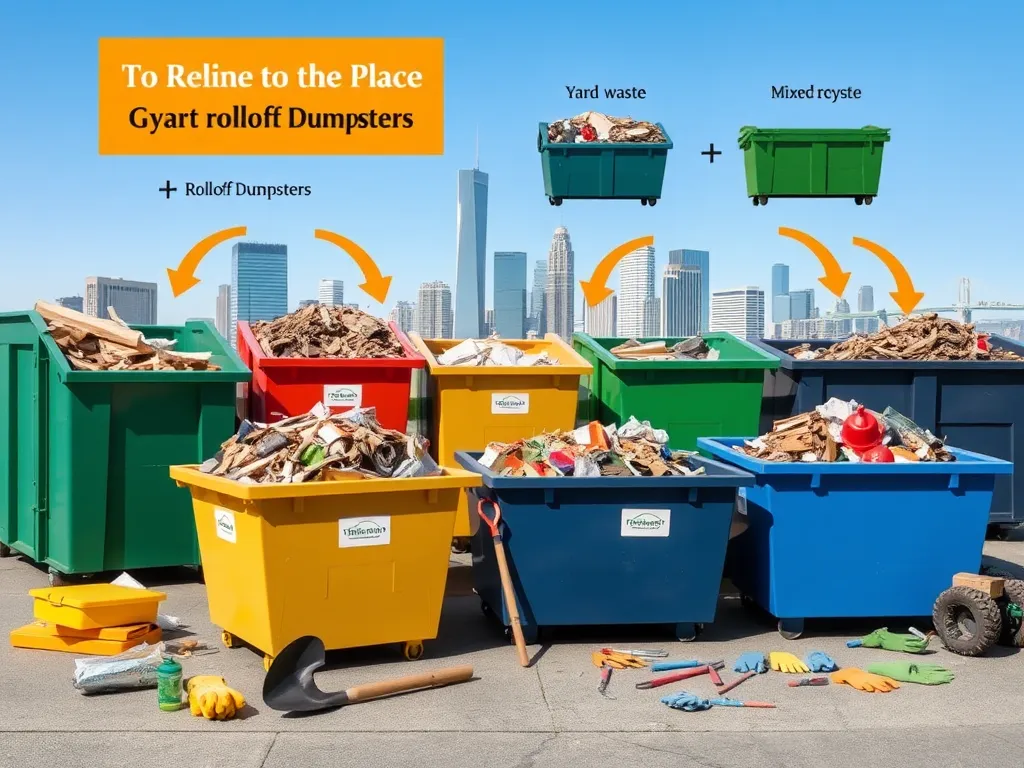Everything You Need to Know About Roll-off Dumpsters

The Ultimate Guide to Roll-off Dumpsters
Roll-off dumpsters are an essential tool for managing large amounts of waste, making them invaluable for both residential and commercial projects. These large, open-top containers are designed for easy loading and transportation, allowing for efficient cleanups of construction sites, home renovations, and even special events. The convenience and flexibility offered by roll-off dumpsters make them a popular choice for anyone dealing with substantial debris.
One of the primary benefits of using roll-off dumpsters is their size variety, accommodating everything from small home cleanouts to massive construction projects. Roll-off dumpsters come in various dimensions, typically ranging from 10 to 40 cubic yards, allowing users to select the right size for their specific needs. Additionally, these dumpsters can be delivered directly to a site, providing immediate support for waste management and disposal.
When renting roll-off dumpsters, it's important to consider the different types of waste materials you may be disposing of. Certain items may not be allowed in standard dumpsters due to environmental regulations or health hazards. Understanding the guidelines around what can and cannot be disposed of in roll-off dumpsters helps ensure a smooth rental experience and compliance with local regulations. Selecting the appropriate type of dumpster is crucial for effective waste disposal.
For efficient waste management solutions, residents can rely on services offered in Beatrice Nebraska.
Overall, roll-off dumpsters provide a practical solution for waste management challenges. Whether you're embarking on a DIY renovation, handling debris from a construction project, or cleaning out your garage, roll-off dumpsters simplify the process by allowing for easy disposal of large quantities of waste. Their flexibility and convenience make them a popular choice among homeowners, contractors, and businesses alike.
In this article, we will explore various use cases, types, pricing, and considerations for using roll-off dumpsters effectively. We will also delve into environmental concerns and safety tips to help ensure that your waste disposal process is efficient, compliant, and responsible.
Use Cases for Roll-off Dumpsters
Roll-off dumpsters are particularly beneficial for residential cleanouts and renovations. During a home renovation, homeowners can generate a significant amount of debris, including old furniture, construction materials, and landscaping waste. A roll-off dumpster provides an efficient solution to manage and organize this waste, allowing homeowners to focus on their renovations without worrying about disposal.
Construction site waste management is another common use case for roll-off dumpsters. Construction projects, whether they are new builds, remodels, or tear-downs, typically generate significant amounts of waste, including lumber, concrete, and metal scraps. Having a roll-off dumpster on-site enables contractors to quickly and easily dispose of waste, keeping the site safe and organized.
Commercial property cleanup often requires the use of roll-off dumpsters as well. Businesses undergoing renovations or cleanouts may find themselves with bulky furniture, outdated equipment, or excessive inventory. A roll-off dumpster can streamline this process, allowing businesses to reclaim their space faster and more efficiently.
Event waste disposal is another area where roll-off dumpsters come in handy. Large events, such as festivals, concerts, and trade shows, can produce substantial amounts of rubbish. By having roll-off dumpsters available on site, event organizers can ensure that waste is collected and disposed of appropriately, maintaining cleanliness and sustainability.
Types of Roll-off Dumpsters
Roll-off dumpsters come in various standard sizes and capacities to accommodate different disposal needs. Common sizes range from 10, 20, 30 to 40 cubic yards, with each size designed to handle varying amounts of waste. Choosing the right size is crucial as it impacts both the cost of the rental and the effectiveness of the waste management process.
In addition to standard sizes, specialty dumpsters are available for specific types of waste. For instance, there are dumpsters designed exclusively for hazardous waste, construction debris, or recyclables. These specialty dumpsters comply with environmental regulations and help ensure that sensitive materials are disposed of properly.
Low-boy and high-boy dumpsters are also types of roll-off containers. Low-boy dumpsters are designed for easier loading, often having lower sidewalls, making them an ideal option for heavy materials like dirt or concrete. High-boy dumpsters, on the other hand, feature taller walls, allowing for larger capacity and are perfect for bulky items.
Finally, there's a distinction between temporary and permanent roll-off containers. Temporary roll-off dumpsters are usually rented for short-term projects, while permanent dumpsters may be used for ongoing waste disposal needs at commercial properties. Understanding the right type for your situation will improve waste management efficiency.
Pricing and Cost Factors
When it comes to pricing, the average rental price for roll-off dumpsters can vary widely based on several factors. Typically, rental costs can range from $200 to $800, depending on the size, the rental duration, and the type of waste being disposed of. Variable pricing allows clients to find an option that best fits their budget and needs.
Several factors influence the pricing of roll-off dumpster rentals, including location, size, weight limit, and type of waste. In urban areas, costs may be higher due to higher demand and operational expenses. Additionally, larger dumpsters and those intended for heavier waste often incur higher rental fees.
Hidden fees can sometimes catch renters off guard. These may include charges for exceeding weight limits, extended rental periods, or extra fees for materials that are prohibited in standard dumpsters. It's crucial to thoroughly review the rental contract to ensure you understand all the terms and pricing, including potential hidden fees.
To get the best rates for roll-off dumpster rentals, it's advisable to shop around. Request quotes from multiple companies and compare them based on services offered, customer reviews, and transparency in pricing. Booking early and off-peak may also provide savings, as demand influences rental rates.
How to Choose a Roll-off Dumpster Rental Service
When seeking a roll-off dumpster rental service, several factors should be considered. Begin with identifying your specific needs, such as the type of waste, the expected volume, and the rental duration. Ensuring that the chosen company can cater to these requirements will lead to a successful rental experience.
Customer service and reliability are also paramount in the selection process. Look for companies with positive reviews regarding their responsiveness, on-time deliveries, and overall professionalism. A trustworthy service will guide you through the rental process and provide support as needed.
It's essential to ask important questions before finalizing a rental agreement. Inquire about weight limits, what materials are allowed, any additional fees, and the logistics of drop-off and pick-up. Clear communication helps prevent misunderstandings and ensures a smooth rental experience.
Comparing local companies can reveal significant differences in services and pricing. Interacting with multiple vendors not only provides a better understanding of your options but also may uncover potential discounts and service packages that could benefit your project.
Environmental Considerations
Recycling practices with roll-off dumpsters play a critical role in waste management. Many rental companies implement recycling programs that separate various waste materials, ensuring that items such as metals, plastics, and wood are appropriately processed and repurposed.
Understanding proper waste disposal laws is crucial when using roll-off dumpsters. Each municipality may have different regulations regarding what can be disposed of and how waste should be handled. Compliance with these laws is essential to avoid potential fines and penalties.
Roll-off dumpsters support sustainability efforts by encouraging responsible waste disposal and recycling practices. Many service providers strive to minimize landfill waste by diverting recyclable materials from traditional disposal, contributing to a more environmentally friendly waste management system.
Alternatives to traditional waste disposal may include donating usable items, composting organic materials, or utilizing local recycling centers. Exploring these options can reduce waste and positively impact the environment, and roll-off dumpsters can aid in gathering and organizing materials for such efforts.
Safety Tips for Using Roll-off Dumpsters
Proper loading techniques are critical for using roll-off dumpsters safely and effectively. Ensure that heavy items are placed in the bottom and lighter materials on top to maintain balance and prevent shifting during transport.
Avoiding overloading the dumpster is crucial for safety and compliance. Exceeding weight limits can lead to extra fees and may pose safety risks during transportation. Always follow the guidelines provided by your rental company.
Familiarizing yourself with local regulations regarding dumpster placement is essential. Some areas may have specific zoning laws or requirements for placing dumpsters, such as needing permits or maintaining clear pathways for traffic.
Wearing appropriate safety gear when handling waste is paramount. Use gloves, masks, and protective clothing to mitigate risks associated with handling potentially hazardous materials, ensuring your safety throughout the waste disposal process.
DIY Projects and Roll-off Dumpsters
Home renovation projects often require the use of roll-off dumpsters to manage debris and waste efficiently. Whether you're remodeling a kitchen or clearing out an attic, having a dumpster on site streamlines the disposal process, keeping your space organized and safe.
For efficient waste disposal during DIY projects, plan ahead for the type and amount of waste you will generate. Designate a specific area for materials and ensure that items are placed in the dumpster as you work to avoid clutter and chaos.
Organizing materials in a dumpster can maximize your space and prevent unnecessary waste. Consider separating recyclables from general trash, and compact materials where possible to make the most out of the dumpster's capacity.
After completing your DIY project, recycling is an important step. Ensure that leftover materials are disposed of responsibly, utilizing local recycling services for materials like wood, metal, and plastics. This practice reinforces your commitment to sustainability and responsible waste management.
